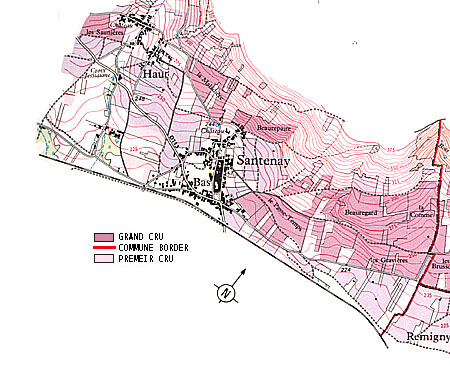Salu2food(Home)
Wine
Regiions
Old World
France
Burgandy
Cote d'Or
Cote de Beaune
SANTENAY
The only vineyards that belong to the Cote D'Or wine district, but do
not come within the department of that name, lie just to the west and southwest
of Santenay Cheilly-les-Maranges, Dezize-les-Maranges and Sampigny-les-Maranges
are politically in the Saone-et-Loire department while their wines are entitled
to the Cote de Beaune-Villages appellation. The properties there are mainly
small and the terrain is very hilly in places. These villages have few visitors
even during the busiest weeks of the tourist season. The wines made here
are mostly quite light in taste, but they can be pleasant. Most of the local
growers also have land in Santenay, the Hautes-Cotes de Beaune or elsewhere,
so that their cellars may contain some wine surprises. Of the three Maranges
communes Cheilly-les-Maranges is the most productive, Sampigny-les-Maranges
the smallest.
The village of Santenay is known not only for its wine but also for its
waters: medicinal springs were discovered here in Roman times and they are
still being exploited. Under an idiosyncratic French law, casinos are allowed
only in spas - and so Santenay has its gambling palace. It is partly because
of the waters that Santenay (formerly known as Santenay-les Bains) has quite
a concentration of second homes belonging to people who visit the place
frequently. The village consists of an upper and a lower section (Santenay
Haut and Bas), with a band of vineyards 1 kilometre (1,100 yards) wide between
them. The underlying geology of this part of the Cote is very complex. Faults
break up the smooth sequence of strata Consequently the soil in Santenay
is very varied so that different styles of wine emerge, most of it red.
According to a local saving, the best vineyards lie "east of the belfry
" - and it is there than most of the Premiers Crus are found, including,
Les Gravieres, La Comme and Clos de Tavannes. Les Gravieres with its heavy
stony soil is the best-known, while Clos de Tavannes, on the border with
Chassagne. has a name for solid, reserved wines. La Comme, a big vineyard
and farther up the slope, has lighter soil and corresponding wine.
Red Santenay is a rather reserved kind of burgundy firm of structure and
modest in finesse and complexity. The better wines, however, can mature
into fine bottles. Some of the whites can be amazingly good, examples being
the Clos des Gravieres from the firm of Prosper Maufoux, which is based
in Santenay wines from Remigny, a village southeast of Santenay, are sold
under the Santenay appellation.


